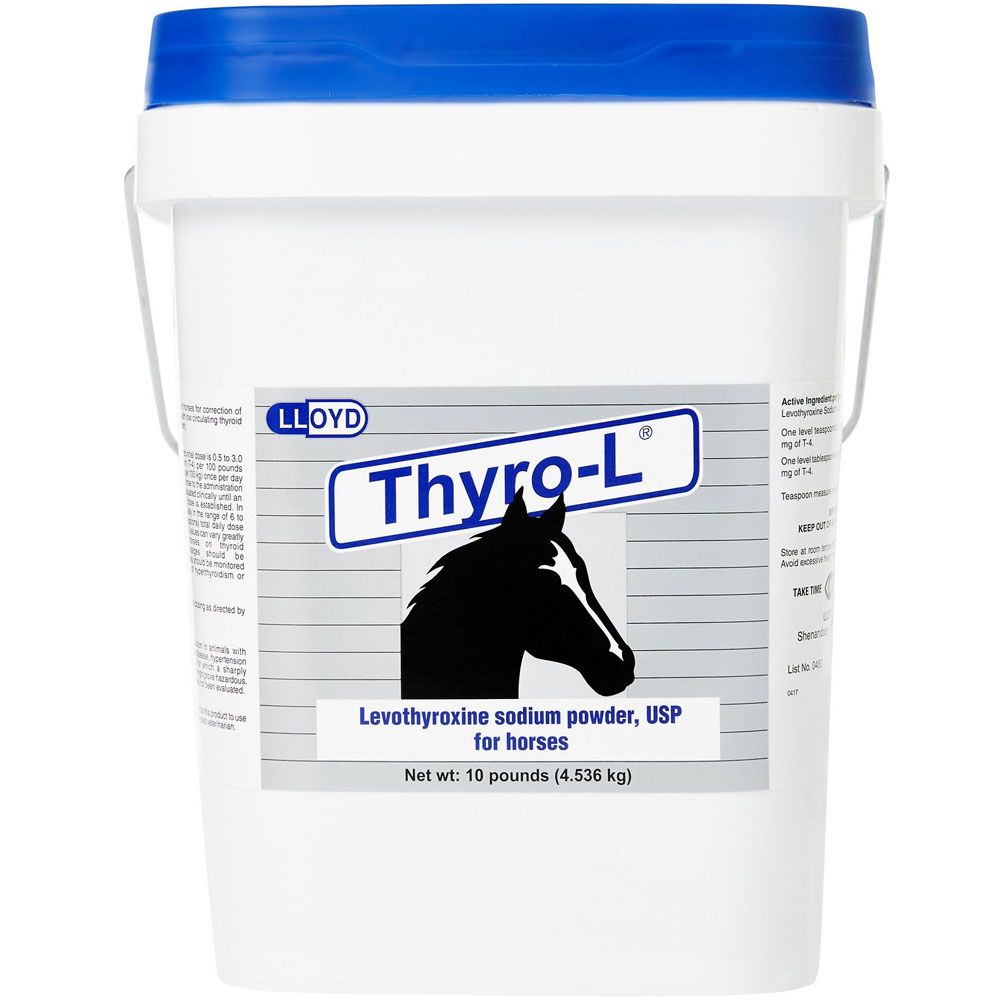SAVE 15% OFF 15% OFF Use Code EPX15 *
Thyro-L for Horses - 10 Pounds - [Thyroid Support]
- Notice
- Description
- Ingredients
- Directions
- FAQ
- Reviews
Notices
Does not qualify for free shipping.
Description
Thyro-L is a highly effective levothyroxine sodium powder supplement formulated specifically for horses. It is commonly prescribed to manage equine hypothyroidism and related endocrine disorders. In addition to supporting normal thyroid function, Thyro-L can also aid in weight management for horses with insulin resistance and may help prevent conditions such as laminitis and hyperlipidemia.
Key Benefits of Thyro-L for Horses
- Supports thyroid hormone balance to manage hypothyroidism in horses
- Helps reduce weight in insulin-resistant horses
- May help prevent laminitis and hyperlipidemia
- Easy-to-administer powder form for accurate dosing
- Includes convenient teaspoon measuring scoop
- Veterinarian-trusted levothyroxine supplement for equine health
How Thyro-L Works
Thyro-L contains levothyroxine sodium, a synthetic form of the thyroid hormone thyroxine (T4). It restores proper hormone levels in horses suffering from hypothyroidism, improving metabolic rate, energy levels, and weight regulation. This stable, reliable formulation ensures consistent therapeutic results.
Indications for Use
Indicated for horses diagnosed with hypothyroidism or low circulating thyroid hormones. Thyro-L may also be used as part of a veterinarian-recommended treatment plan for metabolic syndrome, insulin resistance, obesity, laminitis, and related conditions.
Note: This item does not qualify for free shipping.
Ingredients
Guaranteed Analysis
| Component | Amount |
|---|---|
| Levothyroxine Sodium USP | 0.22% (1,000 mg per pound / 453.6 g) |
| Per Teaspoon (Level) | Approximately 12 mg of T-4 |
Directions
Click here to view the Thyro-L Product Label and Drug Facts Sheet (PDF)
Thyro-L Levothyroxine Sodium Powder for Horses is used to support horses diagnosed with hypothyroidism or to aid in weight management in insulin-resistant horses. This veterinary-prescribed supplement delivers precise thyroid hormone replacement to regulate metabolism and prevent complications like laminitis or hyperlipidemia.
Dosage Guidelines:
The initial recommended dose is 0.5 to 3.0 mg of levothyroxine sodium (T-4) per 100 lbs of body weight (1 to 6 mg per 100 kg) administered once daily or divided into two doses. For an average 500 kg (1,100 lb) horse, this equates to approximately ˝ to 2˝ level teaspoons per day.
Most horses respond to a maintenance dose between 6 to 36 mg daily (˝ to 3 level teaspoons). Dosage should be customized based on clinical response and serum T-3 and T-4 levels. Regular monitoring for signs of hyperthyroidism or adverse reactions is advised.
Administration Instructions:
Mix the prescribed dose of Thyro-L with a small portion of concentrate feed or top-dress on moistened grain to ensure adherence. It can also be administered directly by mouth.
For weight loss protocols, administer 48 mg (4 teaspoons) daily for 3–6 months. Miniature horses or ponies may receive 24 mg/day. Once the target weight is achieved, taper the dosage: 24 mg/day for 1 week, then 12 mg/day for 2 additional weeks to safely discontinue use.
Caution:
Federal law restricts this medication to use by or on the order of a licensed veterinarian.
Warnings:
Use with caution in horses with pre-existing cardiovascular disease, hypertension, or other conditions that may be worsened by increased metabolic activity. Safety has not been established in pregnant mares.
FAQ
Thyro-L should be given exactly as directed by your veterinarian. Thyro-L is a powder that is to be given by the mouth. Thyro-L can be administered by mixing the daily dose in the concentrate or by top dressing on grain, preferably rolled or ground. The suggested initial dose is 0.5 to 3.0 mg levothyroxine sodium per 100 lbs body weight once per day or divided in doses. The recommended daily dose is 1/2 to 2 1/2 level teaspoons for a 1,100 lb horse. Response to the administration of Thyro-L should be evaluated clinically until an adequate maintenance dose is established. In most horses, this is usually in the range of 6 to 36 mg total daily dose. Serum T-3 and T-4 values can vary greatly among individual horses on thyroid supplementation. Dosages should be individualized and horses should be monitored daily for clinical signs of hyperthyroidism or hypersensitivity.
For weight loss, Thyro-L can be administered by mouth or in the feed at a dosage of 48 mg per day for 3-6 months to induce weight loss. Smaller ponies and miniature horses can receive 24 mg per day for the same period. Treated horses should be weaned from Thyro-L once ideal weight has been attained by reducing the dosage to 24 mg for 1 week, followed by 12 mg per day for an additional 2 weeks.













